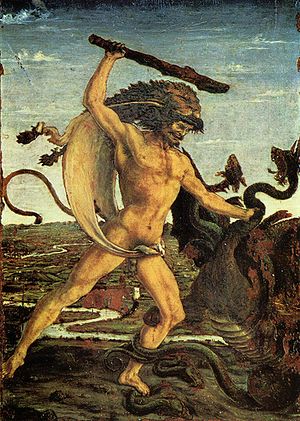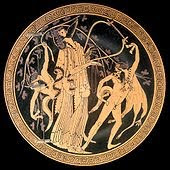The Twelve Labors of Hercules or Dodekathlos (Greek: δωδέκαθλον, dodekathlon) are a series of archaic episodes connected by a later continuous narrative, concerning a penance carried out by Heracles, the greatest of the Greek heroes, whose name was later romanised as Hercules. The establishment of a fixed cycle of twelve labours was attributed by the Greeks to an epic poem, now lost, written by Peisander, dated about 600 BC (Burkert).
Driven mad by Hera, Heracles slew his own children. To expiate the crime, Heracles was required to carry out twelve labors set by his archenemy, Eurystheus, who had become king in Heracles' place. If he succeeded, he would be purified of his sin and, as myth says, he would be granted immortality. Heracles accomplished these tasks, but Eurystheus did not accept the cleansing of the Augean stables because Heracles was going to accept pay for the labor. Neither did he accept the killing of the Lernaean Hydra as Heracles' nephew and charioteer, Iolaus, had helped him burn the stumps of the heads. Eurystheus set two more tasks (fetching the Golden Apples of Hesperides and capturing Cerberus), which Heracles performed successfully, bringing the total number of tasks up to twelve.
The labours
As they survive, the Labours of Heracles are not told in any single place, but must be reassembled from many sources. Ruck and Staples assert that there is no one way to interpret the labours, but that six were located in the Peloponnese, culminating with the rededication of Olympia. Six others took the hero farther afield. In each case, the pattern was the same: Heracles was sent to kill or subdue, or to fetch back for Hera's representative Eurystheus a magical animal or plant. "The sites selected were all previously strongholds of Hera or the 'Goddess' and were Entrances to the Netherworld".
A famous depiction of the labours in Greek sculpture is found on the metopes of the Temple of Zeus at Olympia, which date to the 450s BC.
In his labours, Heracles was sometimes accompanied by a male companion (an eromenos), according to Licymnius and others, such as Iolaus, his nephew. Although he was only supposed to perform ten labours, this assistance led to him suffering two more. Eurystheus didn't count the Hydra, because Iolaus helped him, or the Augean stables, as he received payment for his work, or because the rivers did the work.
A traditional order of the labours found in Apollodorus is:
- Slay the Nemean Lion.
- Slay the nine-headed Lernaean Hydra.
- Capture the Golden Hind of Artemis.
- Capture the Erymanthian Boar.
- Clean the Augean stables in a single day.
- Slay the Stymphalian Birds.
- Capture the Cretan Bull.
- Steal the Mares of Diomedes.
- Obtain the girdle of Hippolyta, Queen of the Amazons.
- Obtain the cattle of the monster Geryon.
- Steal the apples of the Hesperides.
- Capture and bring back Cerberus.
As a reward for finishing these twelve treacherous tasks, he was given the gift of immortality after his death by Zeus, his father. Hera forgave him and gave him her daughter Hebe for his bride.


Nema komentara:
Objavi komentar